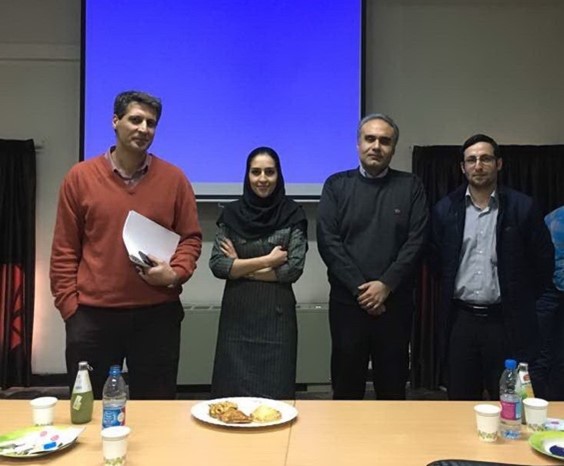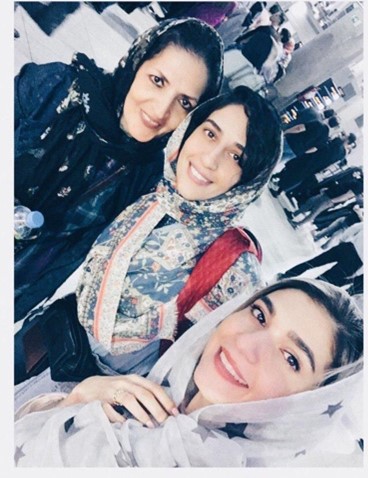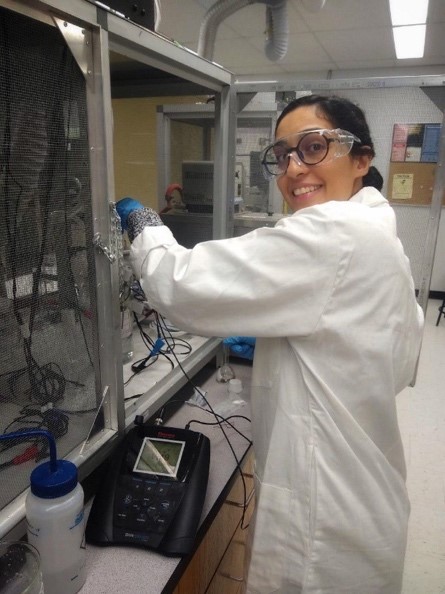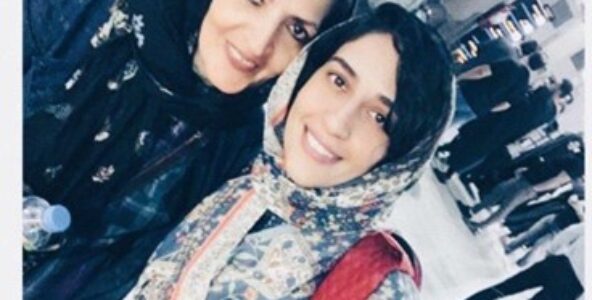Embarking on a journey to study abroad can be exciting and terrifying – saying goodbye to the comforts of home is never easy, but you are also welcoming in new opportunities for personal and professional growth. When studying overseas, students can discover diverse career prospects, distinct cultural perspectives, and educational opportunities that they may not have been exposed to in their home countries.

For Ph.D. Chemistry student Elham Salehi Alaei leaving Iran to pursue a higher education in Canada came with a desire to develop a new sense of independence. “As an adult, I wanted to support myself financially and to become more responsible for my life,” Salehi Alaei shares. “If I could face different challenges without the direct support of friends or family back home, I thought, I would learn and grow as a person.”
Salehi Alaei completed her Master’s degree at the University of Tehran in Material Engineering, where she gained an interest in corrosion science. With dreams of studying abroad, moving to Canada seemed like the best fit for her because she wanted to learn in a country that accepted students of different cultural, religious, and ethnic backgrounds. While searching for educational opportunities at the PhD level, she came across Western University’s Electrochemistry and Corrosion Science Group (ECS) led by Professor James J. Noël.
“When I read about the lab online, I found that the researchers at Western were working on projects that I was really interested in, so I applied for the Ph.D. position,” says Salehi Alaei. “They are such a big research group, and knowing Canada is a multicultural country, I thought I would learn so many different perspectives and make a lot of connections.”

For Salehi Alaei, being accepted as a Ph.D. student with the lab was a dream come true and she was eager to begin a new life in Canada. In August of 2019, she packed her bags and said goodbye to her friends, family, and the country she called home – leaving Iran was difficult, but she soon realized that it was just one of the many challenges she would have to face during her journey abroad. As a member of the ECS lab, she was going to study a topic that she had never explored before as a scientist: nuclear energy.
The ECS lab’s primary research focus is finding solutions for the disposal of high-level nuclear waste, a project they are working on in collaboration with the Nuclear Waste Management Organization (NWMO). Canada is at the forefront of developing nuclear technology and research, with 19 nuclear reactors currently in operation. The country plans to expand its nuclear capacity, which, from an environmental perspective, is a worthy goal – nuclear is a clean energy source that does not produce air pollutants like greenhouse gases. However, one of the most pressing challenges is finding ways to dispose of used nuclear fuel, a hazardous waste product that can remain radioactive for up to 1 million years.
Beyond the science, the work that the lab is completing has a greater purpose: to protect citizens and the environment from unsafe exposure to nuclear waste – exposure to radionuclides could cause sickness, disease, or loss of life. Salehi Alaei was eager to contribute to this research project because she wanted her work to help solve real-world problems – however, as a student from Iran, she didn’t have the same opportunities to learn about nuclear energy.

For decades, the United States and other international nations have imposed various economic, scientific, trade, and military sanctions against Iran, which have caused economic hardship and sparked widespread protests in the country. In 2006, sanctions were applied after Iran did not comply with UNSC Resolution 1696, which insisted that the nation stop its uranium enrichment program – enriched uranium is crucial for both civil nuclear power generation and military nuclear weapons. While Iran says its nuclear program is for civilian purposes, international governments fear it is intended for the development of nuclear weapons. One nuclear power reactor is currently operating in Iran, although most enriched uranium has been removed from the country.
As a result of the sanctions, Iran has a shortage of the supplies, materials, and resources necessary to study nuclear energy production. “Some of the materials related to high-risk projects, such as nuclear, are unavailable to students, scientists, or engineers in Iran,” Salehi Alaei adds. “So, when I came to study in Canada, I had zero background knowledge about the project we are studying.”
When Salehi Alaei began her Ph.D. with the ECS lab, she felt like she was caught between two different worlds – trying to learn in a different language was challenging enough, but she also had to study a science topic that she was unfamiliar with at a Ph.D. level. “At the beginning of my studies, I felt lost…I didn’t know when to turn to someone for advice because I thought everyone in the lab was busy with their work,” she admits. “I was unfamiliar with the different materials, techniques, and instruments being used – I wanted to contribute, but I felt helpless.”
After speaking to Professor Noël about her concerns, he paired Salehi Alaei up with a postdoctoral fellow and a Ph.D. student from the lab who acted as her mentors. The students supported her and taught her everything she needed to know before she felt comfortable working independently – for Salehi Alaei, collaborating with other members of the lab assured her that she was on a path to success. “I shadowed my mentors and watched them complete experiments, so I had a first-hand look at how I should do things,” explains Salehi Alaei. “Jamie, my supervisor, is also a kind and helpful person who always has a solution for my problems – everyone in the lab helped me feel more confident in myself and my abilities.”
Fortunately, the ECS lab is a diverse group of individuals from various cultural and ethnic backgrounds, many of whom are international students. Hurdling over various personal, educational, and professional obstacles is difficult for anybody to do on their own – although Salehi Alaei left Iran to become more self-reliant, she needed a support system, which she found in her supervisors and her lab mates.

Studying abroad comes with a lot of emotions – excitement, fear, curiosity, or even loneliness. When Salehi Alaei took the first step and signed up for her Ph.D. studies at Western, she was thrilled by the idea of living and learning in a new country; however, she also knew that this experience would come with a few roadblocks – she would have to support herself financially, build connections, and learn a new science topic without her family and friends by her side. Yet, despite the challenges she had to face, her experience with the ECS lab shows that the destination is often worth the journey. “When I look back on my journey since the first day I came here, it means a lot to me,” Salehi Alaei shares. “I grew up here as a new person. I’m contributing to a research project that is important to everyone’s daily lives in this country, and I am also making friends and learning new things about myself along the way.”
Although the COVID-19 pandemic forced Salehi Alaei and her lab mates to bid a brief farewell to the lab, the Ph.D. student is now back at school and has begun completing experiments on her own. Along with her peers, she investigates the corrosion of copper-coated carbon-steel canisters that will hold nuclear waste underground until its radioactivity completely decays – some of the most important research concerns container degradation through corrosion because this could lead to the release of radionuclides in the event of container failure. “The research that I am completing with the lab affects every person in Canada – we are ensuring that radioactive nuclear waste does not pose a threat to human safety, which is something I am proud of as a new member of this country,” Salehi Alaei remarks.
Studying abroad comes with a lot of emotions – excitement, fear, curiosity, or even loneliness. When Salehi Alaei took the first step and signed up for her Ph.D. studies at Western, she was thrilled by the idea of living and learning in a new country; however, she also knew that this experience would come with a few roadblocks – she would have to support herself financially, build connections, and learn a new science topic without her family and friends by her side. Yet, despite the challenges she had to face, her experience with the ECS lab shows that the destination is often worth the journey. “When I look back on my journey since the first day I came here, it means a lot to me,” Salehi Alaei shares. “I grew up here as a new person. I’m contributing to a research project that is important to everyone’s daily lives in this country, and I am also making friends and learning new things about myself along the way.”
